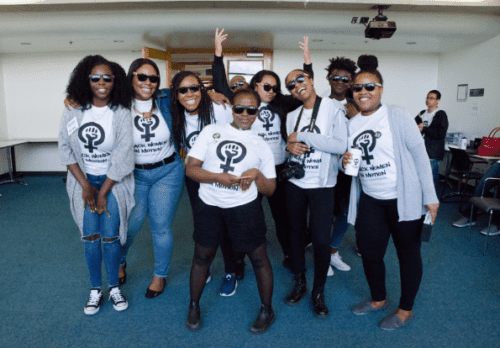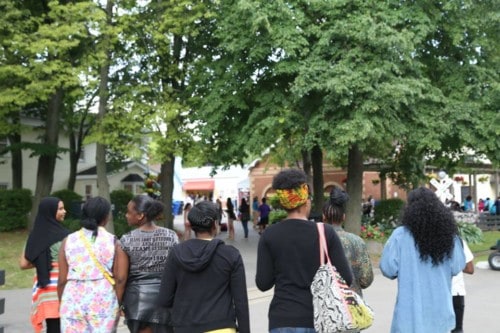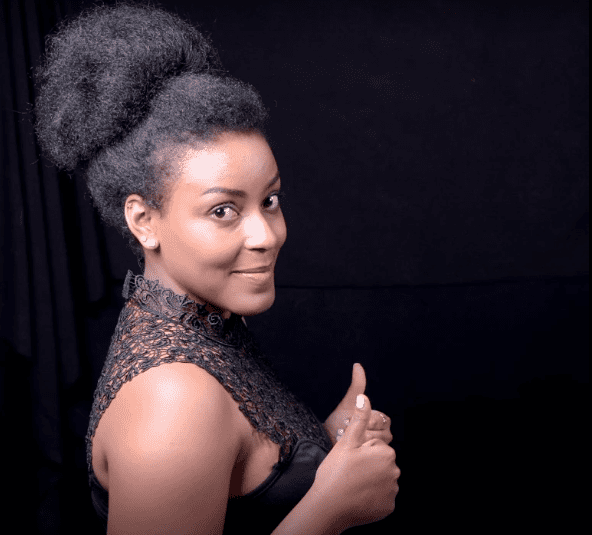Monica Samuel founded Black Women In Motion (BWIM) in 2013 because she believed it was her duty as a Black woman to ensure the well-being, prosperity and advancement of her community.
“I wanted to create and protect opportunities for my sisters,” she says. “When I was growing up I felt alone and isolated and very disconnected from my community. I wanted to feel part of something. I wanted to embrace my culture.”
She remembered the Black women along her journey who were rooting for her, who reached out and lent her a helping hand. “I owe a lot to those women. Their encouragement is what led me here. They never gave up on me, even when I had given up on myself. I think that’s when it hit me. That’s when I knew what I was supposed to.”
Black Women In Motion provides programming, mentorship and support to young women from the African-Caribbean diaspora, to help develop character, leadership, self-confidence and social consciousness. Samuel created it to ensure that young women had a place where they felt safe – safe to be themselves and share while being part of a support network.

SDTC: Tell me a bit about your background.
MS: I was raised by my mother for most of my teenage and adult life. My dad was deported back in 2004. I worked full-time and attended school full-time from grade 10 until now, not because I wanted to, but because I had to. I had to support Mom and expenses related to the home, so I never felt like I had a normal teenage life. I was the first in my family to go to university. A broke girl like me needed to get her hands on as many scholarships as possible. So I basically was a ghost for all of high school.
It wasn’t until university at Ryerson that I started to engage myself in community activities. What I learned from struggling is that I had to make it my duty to do what I could to advance young women in the Black community, so as to not perpetuate that cycle. I believe every woman deserves a real shot at achieving success and WOC represent a valuable, untapped resource to their communities. We water and nurture them; they water and nurture an entire community.
Can you walk us through a typical day in your life?
I’m a workaholic so a typical day is quite boring and redundant. I get up in the morning, pray, do my sun salutations and then I open my laptop. I’ll check the NBA stats from the previous night’s games, see what’s happening on Facebook and Instagram, do a bit of window shopping at IKEA (because interior decorating is my guilty pleasure). After my leisure, I get to down business: brainstorming ideas for future programs and events for BWIM, looking for funding opportunities, researching and connecting with other youth-led groups and agencies to partner up on a project, etc. Two of three hours later I’ll get out of bed, brush my teeth, have lunch and get ready for work. I’ll feed Tommy (my cat I’ve had for seven years), shower him with hugs and kisses and then I’m out the door.
When I get to work, before I log on to my computer, I create a list. Lists really help me to prioritize and stay focused. I’ll create a to-do list of things that I’d ‘like’ to complete for the day; both personal (Monica, family, friends, BWIM) and work-related. After an eight-hour shift, I’ll run to a yoga studio (YogaTree) to catch the last hot yoga class for the night. When I get home I’ll play music for an hour or two, typically winding down with a compilation of Tupac and Coldplay. I’ll play some Super Mario on the Nintendo Wii with Antonio (my partner for the last twelve years), shower, wait for everyone to fall asleep and then open my laptop again. See? Pretty boring.
But despite doing the same routine every day, I try to appreciate the little moments. When I’m not buried in my computer, I enjoy the conversations I have with young people at the Toronto Kiwanis Boys and Girls Club (my current place of employment); a check-in phone call with someone on my team (because we’re all about looking out for our sisters); sharing some laughs with my colleagues over a YouTube video. At twenty-six, I’ve had to slow down for health reasons, and it’s an ongoing process. I think when you constantly use working as a means of coping with trauma, everyday stressors and hardships of life, you stop living and you miss out on so many experiences, opportunities, and moments that you can’t get back.

What has been the biggest challenge you’ve overcome in your work with Black Women in Motion?
Sustainability – I’ve been grant writing for our organization since we started, and it’s a lot of work. The pool of money for community projects dwindles every year, making it more and more competitive to access funds so we can continue doing what we do. Every year I hold my breath and cross my fingers that we will secure the resources we need to do our work.
Work/Life balance – In an ideal world, Black Women In Motion would be my one and only job. But the occasional part-time salary isn’t enough to make a living. At the end of the day, I am passionate about this – I live and breathe BWIM, so most of the hours I put into this work is ‘in-kind.’ For the last four years it’s been BWIM and a full-time job. So when I spend the day at work, I have to come home and work on Black Women In Motion stuff, which is time away from my cat or my spouse. The constant overworking of my brain has started to catch up to me and the anxiety and depression I experience are products of this work cycle.
What do Black Women in Motion have planned for 2017?
Last year was a big year for us: we expanded our team, gave fifteen young people job and training opportunities through our Peer Consent Committee project, and we hosted our second annual This Means WAAR (Weekend of Action Against Rape Culture) Conference at York University. I am always trying to improve and build on the work we’ve already been doing.
For 2017, I see us hosting our WAAR conference again and mini conferences/learning cafes. We are planning on doing more pop-up events and workshops, in response to things as they happen (i.e., Women’s March, Trump’s Anti-Muslim ban). It’s important to stay on top of current events and use those opportunities to educate and inform more people as well as spread awareness of BWIM.
I am most excited about branching off and working in another neighbourhood. We’ve done work in Jane and Finch, Dorset Park, Weston-Mount Dennis, Jamestown, Cabbagetown and Weston-Pellam Park, so I am always excited to expand our reach. And it’s more than just going into another neighbourhood and running a workshop; it’s about learning from that community and the young people within it. Building relationships and networks. These opportunities are learning experiences for the team as much as they are for the young people who participate in our programs.
What are some practical ways we can help BWIM?
Promotion and Marketing – any way you can get the word out to people about what we do/have coming up for people who want to get involved, join our team, participate in our programs, donate, collaborate, etc. Visit here and get involved.
What do you wish people knew about what it’s like being a Black woman in Toronto?
I think I’ve always felt that I’ve had to be twice as smart, work twice as hard, know twice as many people, be twice as pretty…the list goes on. I never felt good enough as a Black woman. But I don’t think that is specific to Toronto alone. Despite what many people think, racism exists. The idea that there is no racism in Canada is absurd. We have racism, bigotry, police brutality and economic discrimination in Toronto and Canada as a whole. Perhaps it’s not as bad as in other parts of the world, but this is still a reality.
What I want people to know about being a Black woman in the 416 is how brilliant, resilient and unapologetically Black we are. I love being Black. I love Black women from Toronto and abroad. In the city we have a lineup of fierce black women at the frontlines holding it down. Whether it’s Yusra Khogali from Black Lives Matter and her unflinching quest for truth, justice and real action for our people, or Jordyn Samules from Journeys InEquity, who provides specialized education for Black and queer folk, grounded in frameworks of Equity and Anti-Oppression, or Aisha Addo, with the ride-share service DriveHer, which is dedicated to women; Black women in Toronto are MAKING THINGS HAPPEN!
Black women have endured the unfathomable. Make no doubt about it, we’ve endured. And we’re still here. We are poignant, prolific, and radiant. We are creating safe, healthy and culturally centered spaces for creative and unapologetic expression for Black people and people of colour. We are drawing strength from our Blackness. We are fighting for justice. We are culturally aware of our ancestry and educating others so they can be as well. We are activists, doctors, lawyers. We slaying this S%&*. Despite all the odds against us. We. Are. Slaying.



 Follow Us On Instagram
Follow Us On Instagram
